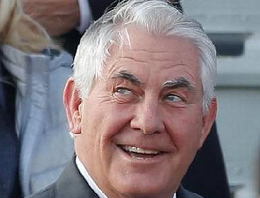
The U.S on Tuesday clubbed Russia along with Iran and North Korea, naming them as countries opposed to Washington’s global interests, setting the stage for a potentially unpleasant conversation between Foreign Ministers of the two countries on Wednesday.
The White House also reiterated that Russia was in cahoots with the Bashar al-Assad regime in Syria that is accused of carrying out a chemical weapons attack on rebels last week.
U.S. Secretary of State Rex Tillerson is in Moscow to meet Russian counterpart Sergey Lavrov and other leaders.
White House Press Secretary Sean Spicer said President Donald Trump had hoped to reach an agreement with Russia in national interest. “But if we cant finalise an agreement in our national interest, then we won’t,” he said.
‘We will be forceful’
“Russia is not an island when it comes to its support for Assad or its lack of acknowledgement of what happened in Syria. Russia is party to several international agreements that Syria is not holding up to. Russia should ensure that they do. The President has been very clear on his position on Russia, and in this particular case, we are going to be very forceful,” Mr. Spicer said, adding that Mr. Tillerson would deliver this message to Moscow.
The White House also released a four-page report that details the assessment of the U.S. intelligence community that Russians were helping the Assad regime cover up the the chemical weapons attack, but Mr. Spicer said “there was no consensus” among the intelligence agencies that Moscow had prior knowledge of the attack.
Mr. Spicer, however, added that the U.S. would be “open to strategic cooperation with Russia” if it can achieve the shared goal of defeating the Islamic State.
Russia has said President Vladimir Putin would not be meeting Mr. Tillerson. Ahead of the visit, the Secretary of State had asked the Russians to choose between the U.S. and its allies, and the regime of Bashar al-Assad in Syria. For the first time in the six-year old civl war, American military operations targeted the regime supported by Russia in missile strikes last week.
Statements by Mr. Spicer and Mr. Tillerson ahead of the meetings sounded a far cry from what President Donald Trump had promised during the election — to seek partnership with Russia in the fight against Islamist terrorism.
Mr. Tillerson and Mr. Lavrov had met in Bonn in February, which the latter said started the process of “normalisation” of bilateral relations. Facing backlash from U.S. opinion-makers and the security establishment, the Trump administration sang a different tune on the eve of Mr. Tillerson’s first visit to Moscow as Secretary of State.
“We want to relieve the suffering of the Syrian people. Russia can be a part of that future and play an important role,” Mr. Tillerson said in Italy after meeting with American allies in the Syrian conflict. “Or Russia can maintain its alliance with this group, which we believe is not going to serve Russia’s interests longer term,” he said referring to the Iran, Russia, Hezbollah axis that supports the Assad regime.
Mr. Lavrov and former U.S Secretary of State John Kerry met 14 times last year for an agreement on Syria, but they failed primarily because the Pentagon was not on the same page as Mr. Kerry.
Andrew Exum, former U.S. deputy assistant secretary of defence and one of the American negotiators with Russia in the Obama administration wrote after missile strikes on Syria last week that it would strengthen Mr. Tillerson’s hand in talks with Moscow.
By ruling out military intervention, Mr. Obama had tied the hands of the negotiators, he said: “We initially offered up carrots… if they would help us remove Bashar al-Assad from power, but by the end, we were practically begging the Russians to just let humanitarian aid shipments into East Aleppo. As one of the U.S. negotiators, I found the whole experience degrading,” he wrote.
But Russia had a different view of Obama administration, Mr. Lavrov told an American publication more than week before the Syrian strike. Asked what he meant by “normalisation”, Mr. Lavrov said: “Normal” is to treat your partners with respect, not to try to impose some of your ideas on others without taking into account their own views and their concerns, always to try to listen and to hear, and hopefully not to rely on a superiority complex, which was obviously the case with the Obama administration. They were obsessed with their exceptionality, with their leadership.”
























